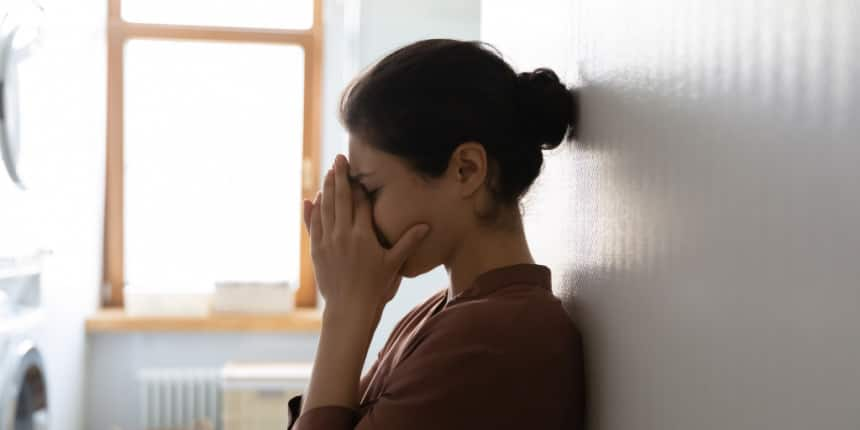How To Deal With Anxiety - Best Ways to Cope with Anxiety Attacks
How To Deal With Anxiety Attacks: What Are Anxiety Attacks?
When we are worried, tense, or fearful, especially about events that are about to occur or that we believe may occur in the future, we experience anxiety.

Humans naturally experience anxiety when they perceive a danger to their safety. It is something we can feel, think about, and physically experience. When dealing with difficult situations, stress or changes, especially those that might have a significant influence on your life, experiencing anxiety is very common. There are many ways to understand how to deal with anxiety attacks. Some of the essential techniques are given in the articles.
Also Read | How To Reduce Exam Stress
How To Deal With Anxiety Attacks: Try Breathing Exercises
One of the ways of anxiety management and efficiently reducing anxiety is to practise breathing exercises. Breathing exercises may be performed anywhere and just take a few minutes. If you include it in your daily routine, you will get the most benefits. Breathing exercises can be performed while standing, sitting in a back-supporting chair, lying on a bed, or lying on a yoga mat on the floor. You can follow the 4-7-8 breathing exercise:
Make yourself comfortable.
Exhale completely through your mouth, making a whoosh sound.
Close your mouth and inhale quietly through your nose to a count of 4.
Hold your breath for a count of 7.
Exhale completely through your mouth, making a whoosh sound to a count of 8.
Repeat this for 2-3 minutes
The nervous system benefits naturally from this exercise. It also helps in dealing with anxiety.
How To Deal With Anxiety Attacks: Grounding Techniques
Anxiety attacks can disconnect you from the world. Grounding technique is one of the beneficial ways for reducing anxiety and for effective anxiety management.
You may have a sense of disconnection from reality during anxiety attacks. This is because anxiety may overwhelm other senses depending on its intensity.
A specific form of grounding technique is the 5-4-3-2-1 approach. It assists in shifting the individual's attention from the causes of stress.
Focus on 5 different objects.
Pay attention to 4 different noises.
Touch 3 separate things.
Name 2 distinct odours.
Describe 1 item you can taste.
Also Read | How To Overcome Procrastination
How To Deal With Anxiety Attacks: Take A Walk
Go for a walk. A person can leave a stressful situation by walking, and the rhythm of walking may also help them calm their breathing. Going for a walk is one of the best ways for anxiety management and reducing anxiety. Exercise and walking causes the body to release endorphins, which calm the body and elevate mood. Regular exercise might help lower anxiety over time, which could result in a decrease in the frequency or intensity of anxiety attacks.
How To Deal With Anxiety Attacks: Muscle Relaxation Technique
Muscle tightness is another sign of anxiety attacks. The use of muscular relaxation techniques can potentially help in reducing anxiety. This is due to the possibility that other symptoms, such as fast breathing, may also go away if the mind detects that the body is relaxing. Muscle relaxation is a potentially effective way of anxiety management.
For coping with anxiety and panic attacks, gradual muscle relaxation is a well-liked therapy. This includes tensing and then releasing different muscles one at a time. Here is how you can do it:-
Hold the tension on one muscle for five seconds.
As you let go of the muscle, say "relax."
Wait 10 seconds after the muscle has finished relaxing before going on to the next one.
Repeat this for 5-6 minutes.
Also Read | How To Build Confidence And Self-Esteem
How To Deal With Anxiety Attacks: Imagine Your Happy Place
Think of your favourite place. The place where a person feels most at peace should be their happy place. Everybody will have a different idea of the exact location. They will feel peaceful, secure, and at ease there. It may be beneficial to close your eyes and visualise being in this location when an anxiety attack is starting. Consider how peaceful it is there. Additionally, people might picture their bare feet resting on soft rugs, warm sand, or cool soil. Thinking of your happy and peaceful places will make you feel relaxed and at ease. It is one of the ways to understand how to deal with anxiety attacks.
How To Deal With Anxiety Attacks: Talk Therapy
A mental health expert can provide support, assurance, and guidance if anxiety or panic attacks can often interfere with a person's life. People can learn useful coping mechanisms and the underlying causes of their anxiety via therapy. Talk therapy is considered to be one of the most practical ways to understand how to deal with anxiety attacks and discover anxiety management techniques.
Anxiety attacks can cause major distress in our daily life and to our overall body health. It is important to understand what triggers your anxiety and tips for anxiety management. There are many ways to reduce anxiety. Some of these techniques are to practise deep breathing, go for a walk and try talk therapy.
